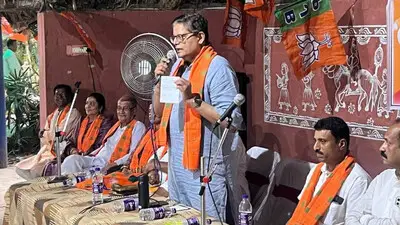Recommended Stories
"... Knowing the mood of the persons who matters here (in Parliament), I had to be extra careful and I had to make my colleagues extra careful. Therefore, many of things which could have been done, rather should have been done, could not be done just at the time of the Budget," he said.
Addressing the industry leaders here, the Finance Minister said the policy shifts are quick and he had to keep in mind the prevailing ground reality that a "decision taken in one House is reversed or changed within 24 hours, when the same proposal approved by one House comes to the other House".
He said the impact of high volatility in international commodity prices, uncertainty and fragile economic growth in the developed nations on Indian economy will have to be addressed collectively by the government, political establishments and the industry.
"While fiscal consolidation will help create more space for private investment demand, improved financing and spending on infrastructure will help strengthen investment," he said.
Mukherjee said the government is focusing on improving domestic demand to promote medium term growth. Commenting on interest rates, he said "in coming months we are looking at reversal of policy rates" adding that this will help in improving business sentiments.
Industry has been pitching for lower lending interest rate as a hard monetary policy has impacted investments as credits have become costly.
In the past year, Mukherjee said, the global economic environment witnessed uncertainty due to political and economic developments. "Despite significant weakness in global demand, international fuel prices have remained buoyant .... Demand in eurozone is nowhere near what should have been if full recovery in eurozone had taken place ... but oil prices are not coming down," he said in his customary post-Budget meeting with industry chambers.
Mukherjee said growth in eurozone area has slowed down and a durable solution to sovereign debt problem remains elusive. Also continuous deceleration in domestic growth for four consecutive quarters from 8.3 per cent to 6.1 per cent had to be taken into account while preparing the Budget proposals for 2012-13.
"It was necessary that topical and emerging concerns were effectively addressed. It could only then I could hope to bring a convergence in the expectations of our investors on macro-economic prospects of economy," Mukherjee said.
He said the Indian economy would grow at 7.6 per cent (plus/minus 0.25 per cent in the 2012-13 fiscal. The economic growth in the current fiscal is expected to slip to 6.9 per cent from 8.4 per cent in the previous two years. India was growing at a rate of over 9 per cent before the global financial crisis pulled down the growth to 6.7 per cent in 2008-09.
Mukherjee said he was confident of bringing down the fiscal deficit, the gap between overall expenditure and revenue, to 5.1 per cent of GDP in 2012-13, from 5.9 per cent in the current fiscal.












